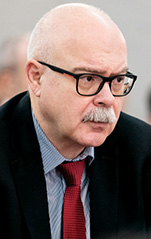The World Through Moscow’s Eyes: A Classic Russian Perspective
To fathom the Ukraine dispute, a Russian scholar and head of the Carnegie Moscow Center shares what he thinks U.S. diplomats need to know about Russia.
BY DMITRI TRENIN
U.S. diplomats dealing with Russia need, above all, to have a firm grasp of the main trend lines in Russia’s history. Spanning 1,250 years from mid-ninth-century Viking Prince Ryurik to President Vladimir Putin, in power for the last two decades, this history matters immensely. They also need to appreciate the unique advantages and attendant vulnerabilities of Russia’s geography, stretching as it does across 11 time zones from Norway in the northwest to North Korea in the southeast, and covering much of northern Eurasia in between.
Equipped with a basic understanding of Russia’s roots and its physical position, they then need to be able to look at the world, including the United States, from Moscow’s perspective.
The Primacy of the State
American diplomats intent on understanding Russia would probably appreciate the primacy of the state in Russian collective experience and thinking. They might even gain the insight that while foreign invasions—Napoleon’s in 1812 and Hitler’s in 1941 immediately come to mind—were disasters on a scale unimaginable by most Americans (the war to push back and defeat the Nazis alone cost 26-28 million lives of a total Russian population of about 200 million), domestic chaos on account of the failure of the rulers of the day to control the vast country and manage popular discontent was far worse, leading to the collapse of the state, the economy, international standing and public morals at least three times: in the early 17th century, in 1917 and, most recently, in 1991.
An uncanny capacity for self-destruction has brought Russia over the precipice several times in the course of the country’s history. Yet each time Russia was able to make a comeback—in a somewhat different form and shape, usually repudiating its previous incarnation, but soon proving to be its former self’s rightful heir in more ways than one. There is a continuum of Russian history from ancient Rus of Novgorod and Kiev to the grand duchy and later czardom of Muscovy, to the Russian empire of St. Petersburg, and on to the Soviet Union and the present-day Russian Federation. A resurgent Russia is not unusual; it is a time-tested historical phenomenon.
Keeping this in mind, Americans dealing with Russia would not be surprised by the near-absolute priority of domestic stability and external security considerations in successive Russian governments’ policies. Understanding that the Russian people spent 250 years under the yoke of Mongol rule, these American diplomats would not be surprised by the stubborn prevalence of Asian political culture in contemporary Russia. Nor would they be surprised—looking at the plains to the west of Moscow stretching all the way to Berlin and Paris, and the steppes populated by nomadic warriors all the way to the Caspian and Central Asia to the southeast—by the profound sense of insecurity shared by all Russian leaders or by their need for rapid mobilization of available resources.
Students of Russian politics and history would probably have to conclude that the roots of Russian autocracy run very deep, and that replacing them with a democratic model cannot be an easy task. The task is not made any easier by the extent to which sheer survival has been the country’s top concern historically and, in light of that, the relatively secondary importance attached to economic and trade issues and even the population’s living standards. This does not close the path to representative government accountable to the people, but it does suggest that a successful model can only arise indigenously rather than be imported.
Ukraine’s movement away from Russia represents a most difficult and painful divorce within the core of the historical Russian state. As such, it is only partly a foreign policy matter.
The Roots of Russian Realpolitik
Those looking at Russia’s foreign relations would soon discover that the country is essentially a loner. It is not part of any international large family, whether Europe, the Atlantic community or the West. Asians do not recognize Russia as Asian, either. Its identity is distinct and unique. At bottom, it is ethnically mainly Eastern Slavic, but culturally most profoundly affected by Christian orthodoxy. For centuries after the fall of Constantinople, Russia was the only independent Eastern Orthodox nation in the world, standing between the Catholic and Muslim-dominated worlds.
Another highly relevant layer was added by Russia’s imperial experience. Its contiguous empire stretched at some point from Finland’s Aland Islands just off Stockholm to Alaska, and from northern Persia to northeastern China. As it expanded, Russia incorporated vast areas populated by Turkic, Finno-Ugric and Mongol peoples, as well as a plethora of ethnic communities in the Caucasus and elsewhere, to create a highly diverse imperial polity, where religious and cultural diversity was usually preserved. While deeply involved in European power politics, Russia was also playing a “Great Game” against the British empire in Asia. The Soviet period added a revolutionary fervor that set Russia apart from the rest of the world. This was followed by superpower rivalry, which brought both true globalism and an Iron Curtain. Now, with the Soviet Union and superpower status gone, Moscow is back on its feet, globally active again, but also virtually alone in the world.
This proud but precarious stance makes it imperative that Russia handle itself—and be seen by others—as a great power. This is particularly important because Russia has often been coming from behind, and was looked down on by the more advanced Western countries as an undeserving upstart, a barbarian, or some such. These days, great power status implies a high degree of national sovereignty, resilience in the face of outside pressure, and freedom of action. In the past, Russia has been willing to pay a high price rather than submit to foreign dominance. World War II—or the Great Patriotic War against Hitler’s invasion, as the Russians refer to it—is a prime example. The experience of that war, with its untold tragedies and ultimate triumph, is the most sacred part of Russia’s collective memory.
Except in the early post-revolutionary period, Russia’s foreign policy has been squarely built on the principles of realpolitik. What matters most is one’s power and one’s will. The weak get beaten; the cowards are cowed. A sound foreign policy is guided by national interests, and requires sobriety and pragmatism. Russia’s preferred model of global governance is a concert of powers, as after the Vienna Congress of 1814-1815 or the Yalta Conference of 1945.
Indeed, the United Nations Security Council, where five permanent members decide jointly on the most crucial security issues in the world, is an ideal model in Moscow’s eyes. True, Russia cannot impose its will on others; but, more important, it can prevent any decision that would not agree with its interests. With bitter memories of communism still fresh, Russian leaders deem all ideologies misleading, and believe that high-sounding values often reveal themselves as hypocritical. In this, basic Russian cynicism about international relations inevitably clashes with what Russians perceive as Western hypocrisy.
This reveals itself most starkly in Russia’s attitude toward U.S. democracy promotion. Even though this endeavor is very different in form and results from the Soviet-era promotion of communism, Russians believe that it conveniently combines ideological needs with geopolitical advantages. Just as any newly established communist regime in the past looked up to Moscow for guidance and support, so new democracies, they argue, seek to curry favor with the United States to consolidate their power and protect their security.
Ukraine Is More Than a Foreign Policy Matter
Moscow does not care much about—and does not think much of—nascent democracy in Georgia or Ukraine, where it prefers to see mostly chaos, oligarchy and mob rule; but it is wary of U.S. military presence and activities in its neighborhood and Washington’s virtually unconditional support for Russian neighbors’ historical or current grievances against Russia.
Ukraine’s movement away from Russia represents a most difficult and painful divorce within the core of the historical Russian state. As such, it is only partly a foreign policy matter. The Russo-Ukrainian separation will take decades and likely generations to become a fact fully accepted in Russia. For Ukraine, the process of nation-building has involved a thorough rejection of anything to do with Russia and severance of all contacts with it.
For Russians, the Atlantic alliance is a U.S.-owned platform for pressuring Russia in order to weaken it and, in extremis, an advanced position from which to attack the Russian heartland.
In Moscow, U.S. policies in Ukraine have been largely seen as aimed at diminishing Russia through undermining its great power position (e.g., Zbigniew Brzezinski’s famous quote that Russia without Ukraine cannot be an empire) and even as a dry run for regime change in Moscow. In Russian eyes, the most dangerous element of U.S. policy has been Washington’s support for Ukraine’s NATO membership. For Russians, the Atlantic alliance is a U.S.-owned platform for pressuring Russia in order to weaken it and, in extremis, an advanced position from which to attack the Russian heartland. Fears of the dangers associated with NATO’s eastern enlargement are probably exaggerated, but they remain an article of faith within the Russian security and military communities, where memories of Hitler’s surprise attack of 1941 live on.
The United States is unlikely to stop supporting its Ukrainian clients, Russian leaders believe. U.S. political and diplomatic support, as well as military assistance, to Ukraine will continue into the future; and thus, a major irritant in U.S.-Russian relations will continue to exist. Yet NATO membership for Ukraine— intolerable for Russia for security reasons—will probably remain out of reach, Russians conclude. Without acknowledging it, Washington cannot ignore the possibility that such a move, even before it is consummated, might precipitate a preemptive Russian action. Since Ukraine clearly matters much more to Russia than it does to the United States, Moscow believes it has a de facto veto on Ukraine’s NATO membership through high-cost military intervention. Should the conflict escalate, Russia will have an edge in escalation dominance. A prudent U.S. policy needs to make sure that its actions in Ukraine do not cause it to stumble into a military conflict with Russia.
A Trying Period Ahead
From Moscow’s vantage point, as far as overall U.S. relations with Russia are concerned, the United States has no best way forward now, only a least bad one. Confrontation is here to stay, at least for the medium term. Possibilities for any serious U.S.- Russian cooperation will be extremely limited over the next five years or so. Whatever the outcome of the 2020 elections, the U.S. body politic will probably continue to need Russia as a villain. This attitude will express itself in ever-mounting sanctions pressure. The specter of an all-powerful America having no real use for Russia while seeking to hurt it whenever it can will, in turn, be used by the Kremlin and its allies to shore up Russian patriotism and civic nationalism.
Vladimir Putin regards President Donald Trump as a realist politician, defending and promoting the U.S. national interest while eschewing liberal expansionism. He believes he can do business with Trump on the basis of Russian and American interests. Alas, Putin also has to acknowledge that the embattled U.S. president has to deal with a Congress and media that are very hostile to Russia, and thus is not capable of materially improving U.S.-Russia relations. Apart from U.S. and Western weariness with Ukraine after six years of conflict there and the relatively modest U.S. interest in that country, the Kremlin has not seen any serious change in the U.S. position on Ukraine under Trump as compared to the Obama administration.
Russians see past and present Ukrainian leaders as desperately trying to ingratiate themselves with those who wield power in the White House or are likely to emerge as winners in U.S. presidential elections: whether Hillary Clinton in 2016 or Donald Trump in 2020. Trump’s own actions, recently subject to impeachment proceedings, are shrugged off as part of the messy business of politics, where abuse of office, even in democracies, is far more frequent than publicly revealed or admitted.
During this trying period, the United States and Russia need to prevent direct military collision between themselves. Unlike during the Cold War, the worst might now result not from a premeditated all-out attack, but rather from accidents, incidents or proxy conflicts escalating to a dangerous level. Conflict prevention and management will require, above all else, direct contacts and 24/7 communication between the military and security departments of the two countries. More substantive dialogue will remain severely constrained.





